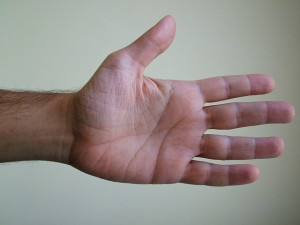to hurry / hasten / make haste
[verb]
[zich haas-ten, haast-te zich, h. zich ge-haast] ![]()
 ‘Haasten’ is a ‘wederkerend werkwoord’: a reflexive verb. So the proper way to say it is: ‘zich haasten’. There is also a regular form of ‘haasten’ which can for example be used when you are rushing somebody else, but is is not as common. Common related nouns are ‘haast’ and ‘spoed’, see below.
‘Haasten’ is a ‘wederkerend werkwoord’: a reflexive verb. So the proper way to say it is: ‘zich haasten’. There is also a regular form of ‘haasten’ which can for example be used when you are rushing somebody else, but is is not as common. Common related nouns are ‘haast’ and ‘spoed’, see below.
Some people are fundamentally against ‘haasten’ and have been promoting the opposite of ‘haasten’ as a lifestyle: ‘onthaasten’. This verb is not reflexive and translates as ‘to slow down (in life in general)’.
Examples:
– “Ik heb me vandaag de hele dag moeten haasten, vanavond plof ik neer op de bank en ik kom er niet meer vanaf!”
(“I have had to hurry all day long, tonight I’m going to crash on the couch and I will not get off it again!”)
– “Je moet je niet de hele tijd zo haasten; dat is niet goed voor je hart!”
(“You shouldn’t be rushing all the time; it’s not good for your heart!”)
– “Al dat gehaast van jou! Ik hoef me nooit te haasten! Weet je wat de truc is? Vijf minuten eerder opstaan!” – “Jij hebt makkelijk praten! Ik ben namelijk vijf minuten te laat geboren!”
(“All this rushing of yours! I never have to hurry! Do you want to know the trick? Get up five minutes earlier!” – “That’s easy for you to say! As a matter of fact, I was born five minutes too late!” Lit. “You have easy talking!”)
– “We moeten ons haasten want anders wordt het te druk op de weg. Heb je alles wat je nodig hebt?” – “Als ik jou maar heb schatje, dan ben ik gelukkig!” – “Bah, mag ik een teiltje?”
(“We have to hurry, because it will get too busy on the roads otherwise. Do you have everything you need?” – “As long as I have you baby, then I’m happy!” – “Ugh, can I have a bucket to vomit in?” A ‘teiltje’ is actually a relatively small basin or washing-up bowl. The expression ‘mag ik een teiltje’ is jokingly used when somebody says something that is about to make you vomit (figuratively).)
Expressions:
– “Haastige spoed is zelden goed”: haste makes waste.
– “Van hot naar her”: to and fro / back and forth / hither and tither.
Related words:
– Haast: haste, hurry, rush [noun] [de haast, <no plural>].
– Gehaast: hurried, hasty, in a hurry [adjective/adverb].
– Onthaasten: to slow down, to lower the pace [verb] [onthaastte, onthaast].
– Gejaagd: hurried, agitated [adjective/adverb].
– Spoed: rush, urgency [noun] [de spoed, <no plural>].
– Snel: fast, quick [adjective].

 Literally ‘in the turn of a hand’ this says that something can be done quickly and without effort, with one move of the hand… So, let’s do this DWOTD in een handomdraai!
Literally ‘in the turn of a hand’ this says that something can be done quickly and without effort, with one move of the hand… So, let’s do this DWOTD in een handomdraai!